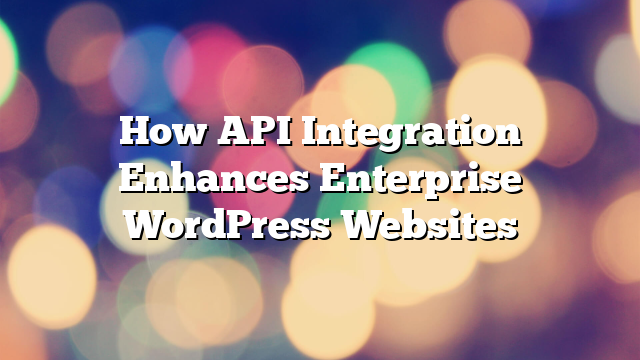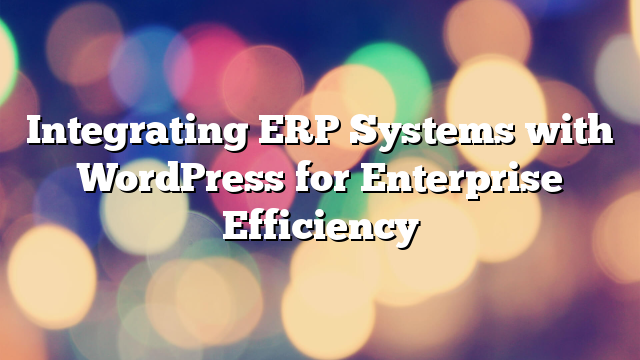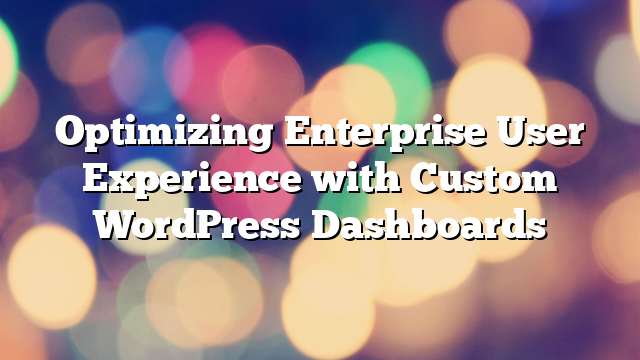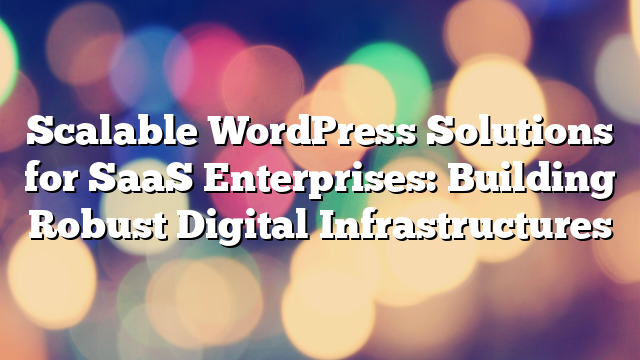How API Integration Enhances Enterprise WordPress Websites
11.12.2024

In today’s interconnected digital landscape, enterprises need robust and flexible solutions to stay competitive. WordPress, as a versatile CMS, becomes even more powerful when integrated with APIs (Application Programming Interfaces). This capability allows businesses to extend their website functionality, connect with third-party services, and deliver enhanced user experiences. In this article, we’ll explore how API integration can elevate enterprise WordPress websites to new heights.
What is API Integration?
An API is a set of rules and protocols that enable different software applications to communicate with each other. API integration allows WordPress to interact with external systems, applications, or services seamlessly. This opens up a world of possibilities, from pulling data from external sources to pushing content to other platforms.
Benefits of API Integration for Enterprise WordPress Websites
1. Streamlined Data Management
With API integration, enterprises can synchronize data between their WordPress site and other systems, such as CRMs, ERPs, or marketing tools. This reduces manual data entry and ensures consistency across platforms.
2. Enhanced User Experience
APIs enable WordPress to deliver dynamic, personalized content based on user behavior, preferences, or real-time data from external systems. This creates a more engaging and customized experience for visitors.
3. Multi-Platform Connectivity
Enterprises often operate across multiple platforms, such as mobile apps, social media, and e-commerce systems. API integration allows WordPress to serve as a central hub, delivering content and data to all connected platforms.
4. Advanced Analytics and Reporting
By integrating with analytics tools, APIs can provide deeper insights into user behavior, website performance, and business metrics. Enterprises can leverage this data to make informed decisions and optimize their strategies.
5. Automation of Workflows
APIs can automate repetitive tasks, such as publishing content, updating product inventories, or sending notifications. This increases operational efficiency and reduces the potential for human error.
6. Scalability and Innovation
API integration allows enterprises to continuously expand their website’s capabilities by integrating new services or technologies. This ensures that their WordPress site remains relevant and competitive in a rapidly evolving digital landscape.
Popular Use Cases for API Integration in WordPress
1. E-Commerce Solutions
Enterprises can integrate WordPress with e-commerce platforms like Shopify, WooCommerce, or third-party payment gateways to create a seamless shopping experience. APIs enable real-time inventory updates, order tracking, and secure transactions.
2. CRM Integration
Connecting WordPress with CRMs like Salesforce or HubSpot helps enterprises manage customer relationships more effectively. APIs allow for automated lead capture, contact synchronization, and personalized marketing campaigns.
3. Social Media Integration
APIs make it easy to integrate social media platforms with WordPress, enabling features like social sharing, real-time feeds, or user login via social accounts. This enhances engagement and simplifies content distribution.
4. Content Syndication
Enterprises managing multiple websites can use APIs to syndicate content across their network. This ensures consistent messaging while reducing duplication of effort.
5. Custom Dashboards
APIs enable the creation of custom dashboards within WordPress, pulling data from multiple sources to provide a centralized view of key metrics and insights for decision-makers.
6. Headless WordPress
In a headless setup, APIs are essential for delivering content from the WordPress backend to various frontends, such as React or Vue.js applications, mobile apps, or IoT devices.
Challenges of API Integration
1. Complexity in Implementation
API integration can be technically complex, requiring expertise in both WordPress development and the external system being integrated. Enterprises may need skilled developers to handle this process.
2. Security Risks
APIs expose WordPress to external systems, potentially creating vulnerabilities. Implementing robust authentication, encryption, and monitoring is essential to mitigate risks.
3. Performance Impact
Improperly configured APIs can slow down a WordPress site, especially if they involve frequent or large data transfers. Enterprises must optimize API calls and implement caching where necessary.
4. Maintenance and Updates
APIs often change over time, requiring updates to integrations. Enterprises must allocate resources to monitor and maintain API connections to ensure uninterrupted functionality.
Best Practices for API Integration in WordPress
1. Choose the Right APIs
Select APIs that align with your enterprise goals and integrate well with WordPress. Evaluate their documentation, reliability, and compatibility before implementation.
2. Secure API Connections
Use secure methods like OAuth 2.0 for authentication and ensure that API keys or tokens are stored securely. Limit access permissions to minimize exposure.
3. Optimize API Performance
Reduce the frequency of API calls and use caching to minimize server load. Test integrations under different conditions to ensure consistent performance.
4. Monitor and Maintain
Regularly monitor API integrations for performance and security issues. Stay updated on API changes and apply necessary updates promptly to avoid disruptions.
5. Test Thoroughly
Conduct comprehensive testing in a staging environment before deploying API integrations to production. This helps identify and resolve issues without affecting live users.
Conclusion
API integration is a powerful tool for enterprises looking to enhance the functionality and user experience of their WordPress websites. From streamlining operations to delivering personalized content, APIs open up a world of possibilities for innovation and growth. By implementing best practices and addressing potential challenges, enterprises can unlock the full potential of API integration and create a seamless, scalable digital ecosystem.
Interested in leveraging API integration for your enterprise WordPress site? Contact AllWebDev today to discover tailored solutions that drive success.



